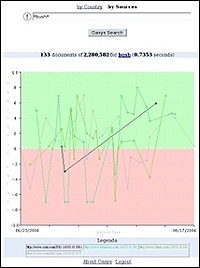 |

|
 |
OASYS can quickly search millions of web documents (RSS feeds) in different languages to measure the amount of positive or negative opinion about a product, politician, or other desired topic and chart how that opinion varies over time. |
|
Computerworld magazine has named research projects by three ISR faculty members as winners in its second annual Horizon Awards for cutting-edge technologies. OASYS, a unique system for online opinion analysis developed by ISR-affiliated UMIACS Director V.S. Subrahmanian (CS/UMIACS), was selected for the award by an independent panel of senior IT executives. In addition, digital fingerprinting technology developed by ISR-affiliated Associate Professor Min Wu (ECE/UMIACS) and Professor K.J. Ray Liu (ECE/ISR) received an honorable mention. The Computerworld Horizon Awards were established in 2005 to alert readers to especially cutting-edge technologies from research labs and companies that are "on the horizon." This year's honorees were selected from more than 200 nominations. | full story at the UM Newsdesk | Computerworld article | Computerworld OASYS profile |
August 22, 2006
|

